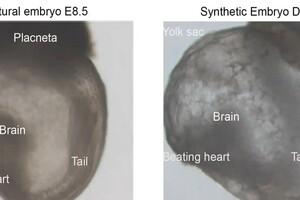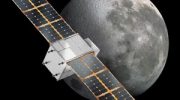For this, the researchers used mouse stem cells.

Scientists from the Weizmann Institute in Israel are the first in the world were able to create “synthetic embryos”. At the same time, the researchers did not need sperm, eggs and the fertilization process, reports The Guardian.
Experts found that the stem cells of mice can assemble themselves into structures similar to embryos. At the same time, they have intestines, brain rudiments and a beating heart.
Read also: Microplastic damages human cells – research
The structures created by scientists are called “synthetic embryos” because of the absence of a fertilization process during their creation. They will help scientists better understand how tissues and organs form during the natural development of embryos.
Scientists also hope that their work will reduce the number of experiments on animals and, ultimately, pave the way for creating new sources of cells and tissues for human transplantation. For example, the skin cells of a leukemia patient could potentially be transformed into bone marrow stem cells to treat his condition.
“Remarkably, we show that embryonic stem cells generate whole synthetic embryos, including the placenta and yolk sac surrounding the embryo,” said lead study author Professor Jacob Hanna.
Last year, the same team of scientists was able to to create an artificial uterus inside which natural mouse embryos were able to grow for several days. In the new work, the device was used to grow stem cells for a week, which is about half of a mouse's gestation period.
Some cells were pretreated with chemicals that included genetic programs to develop into the placenta or yolk sac, while others developed without intervention into organs and other tissues.
Most stem cells failed to form embryos. But 0.5% formed small balls from which separate tissues and organs grew. Synthetic embryos were 95% identical to natural ones in terms of internal structure and genetic cell profiles. Scientists also believe that the organs that formed were functional.
But Hanna emphasized that the synthetic embryos were not “real” and had no potential to develop into full-fledged animals in the future. The scientist founded a company called Renewal Bio, which aims to grow synthetic human embryos to obtain tissues and cells for the treatment of diseases.
Related video
However, scientists who were not involved in the study believe that already it is now necessary to define the framework in which such activities will be regulated before such companies are launched.




